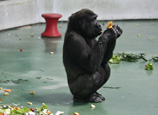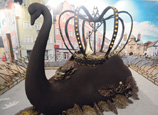
Behind these old houses stand new and larger structures that were built in the old style.
Today, ships are not allowed in the narrow Small River, but ships carrying coal, sand and construction materials constantly are moving south along the wider grand canal, just five minutes from the street.
The grayish wooden houses closest to the river are all similar, except for the Yao family house, which stands out because of the size and architecture. It's the largest house on the street and stands near where the canal and Small River meet.
The strategically located building was once the headquarters of a family lumber company, but now it has been divided between 62-year-old Yao Tongzhi and his brother.
His name Tongzhi, given by his lumber dealer father, is related to wood. Tong means candlenut and zhi is tree branch. His father was born in the mountains near Hangzhou, moved to the city when he was age 13 and worked in many businesses until he saved enough money to start his own company.
At that time, wood processing was mainly done by experienced woodworkers, not machines. Wood was first soaked in water for years, then dried in the sun so that the wood grain tightened and the wood was not easily chipped.
The company was based there because of convenient water transport. Back then the wood was shipped from the mountains and then soaked in the Small River.
"When I was little, the river was filled with wood. The process is much shorter and more efficient today with machines, but the quality is hardly as good," Yao recalls.
He points at an old-style wooden table in the first-floor living room. "That was made by my father's worker 60 or 70 years ago, and it is still good today. But today's wooden furniture is always easily chipped."
The first floor, now Yao's living room, was the company's flagship store with a conference room. The second floor where Yao and his family sleep used to be a dormitory for senior craftsmen and their families. The family also owns a smaller house.
"My father, like all the old merchants then, was very different from today's Chinese businessmen, who show off their money and like to order people around," Yao says. "My father's company was big and he made a lot of money, but he almost never ate chicken in his entire life and my mother helped the servants cook for the whole company every day."
Yao remembers being jealous of the senior woodworkers because they were always the first to have dinner. "Then came around 20 ordinary workers who ate the same dishes. Then my father and our family would eat - we all ate the same food," he adds.


















 Beauties at Beijing Film Academy enrollment site
Beauties at Beijing Film Academy enrollment site


![]()
